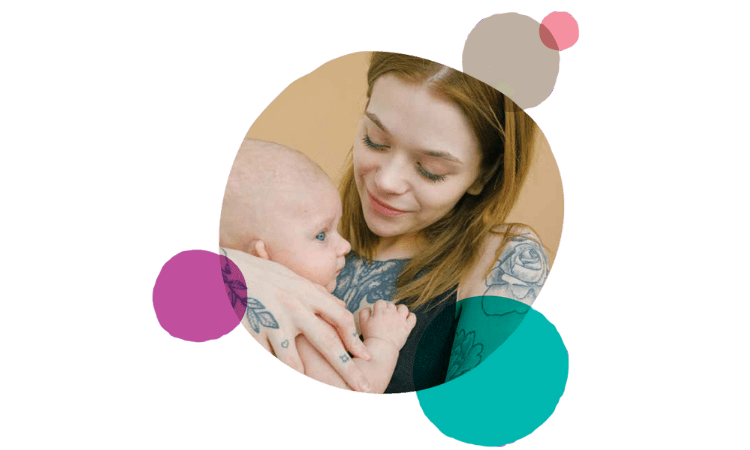Creating Connections is a project working to create a safe space and increase social connection for young people and young mothers through facilitated peer support.
This Department for Health and Social Care-funded project builds on the successful delivery of our “Connect” peer support model working with young mums. The project has three key outcomes:
- Preventing poor mental health through the creation of safe spaces for peers to support each other. This will lead to:
- Improved understanding of their mental health and provision of coping strategies to support themselves.
- Increased levels of connection to people with similar life experiences.
- Prevent the escalation of poor mental health and reduce suicide-risk by encouraging people to seek help and have the confidence to access specialist support.
- Raising awareness of the specific needs of, and reducing the stigma attached to young parents and care-experienced young people at a systems level.
We’re partnering with the Maternal Mental Health Alliance on Creating Connections. Together, we’re working to demonstrate the difference that having access to peer support can have for young mums and increase its availability.
How Creating Connections works
The Creating Connections project works to achieve these outcomes through four approaches:
Delivery of peer groups
To bringing young mums together to reduce isolation, support help seeking behaviour, and reduce the risks attached to suicide ideation.
Workforce training
To raise awareness of additional barriers faced by young mothers and how to effectively support them through a prevention lens. Training the wider workforce of people supporting young parents on the importance of peer support; overcoming and addressing barriers to access; and raising awareness of the additional barriers faced by young mums and how to effectively support them.
Toolkit
Creating a digital resource for professionals who support young mums, designed to increase their awareness of the additional barriers faced by them and how to effectively provide support. View and download the resources.
Social media campaign
Raising awareness across MHF and MMHA social media audiences of the specific needs of young parents and to help people notice the early signs in parents they know.
Through taking part in Creating Connections, mothers will gain access to peer support groups that will reduce loneliness and increase confidence and self-esteem. Professionals will be more aware of the barriers young parents face in accessing peer support and better equipped to support them effectively.
To support the long-lasting impact of Creating Connections, the workforce training materials and digital toolkit will be available as legacy content to inform anyone who is working with or supporting young mums. Key staff will continue to learn about and put into practice the Mental Health Foundation’s peer support approach within their areas.
Why do we need Creating Connections?
Young mothers aged 25 years and under are at an increased risk of experiencing mental illness during pregnancy and after birth compared to those over 25. Postnatal depression is up to twice as prevalent in teenage mothers compared to those over 20 (Public Health England, 2016).
Suicide remains the leading cause of direct maternal death in the first postnatal year, and between 2018 and 2020, there was an increase in the number of teenage maternal suicides (MBRRACE-UK, 2022).
Many young mums face additional difficulties, which can contribute to poor mental health. These risk factors include, but are not limited to, experiences of care, isolation and loneliness, housing difficulties, poverty, and employment discrimination.
Young women who became teenage mothers are 22% more likely to be living in poverty at age 30 than their peers (Public Health England, 2016).

Grace's story*
I became a mum for the first time at the age of 17. The birth was a traumatic experience which ended with me having an emergency C-section. Afterwards, I would constantly think that I was going to lose him. So much so that throughout the night, every 30 minutes, I had to check that he was okay. Behaviour that left me exhausted and even more susceptible to intrusive thoughts.
I was diagnosed with perinatal obsessive compulsive disorder (OCD). Following my diagnosis, things got worse before they got better. I became suicidal and my husband had to take time off work to look after me and my son. I couldn’t function. It was a very scary time. But after I started cognitive behavioural therapy and gave birth to my daughter, my symptoms started to ease. I was able to bond with my daughter and started attending peer support groups, which I found so helpful.
Today, things are so much better. But I do worry for other women experiencing perinatal OCD. Awareness and understanding need to increase among healthcare professionals, because early intervention is vital to good outcomes. I’d also like to see better support for family and friends, so they can spot warning signs early and know how to support someone going through this.
*Not her real name and stock photography used.
Resources to support young mums' mental health
Download our resources to help increase the understanding of young mums’ needs and the importance of peer support.
View the resources
Find out more
For more information on this impactful project, please email JBondzie@mentalhealth.org.uk Project Manager for Creating Connections.